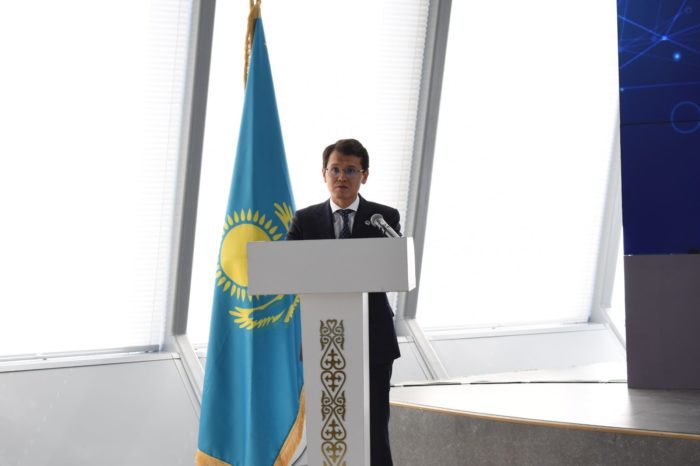NUR-SULTAN – The pandemic has accelerated the pace of digitalization, said Minister of Digital Development, Innovations and Aerospace Industry Bagdat Mussin at the May 13 press conference in the Kazakh capital.

Minister of Digital Development, Innovations and Aerospace Industry Bagdat Mussin. Photo credit: Primeminister.kz.
“2020 has been a challenging year. Everything is online now. The importance of access to communications and the Internet has grown. The Internet saved the world during the pandemic,” Mussin said.
Today government services can be accessed on the eEgov.kz website and through bank applications. Kazakh citizens living abroad have the opportunity to conclude or dissolve a marriage, register the birth of a child, change their first name, last name, given name and receive a death certificate using eGov.kz. The certificates are issued at the embassy or consulate of Kazakhstan.
“We made the most popular services among our citizens living abroad available online. The services were implemented with the Kazakh embassies in 20 countries,” added Mussin.
This year, the equivalence of paper and digital documents was legally established. While receiving notary services, people can provide digital documents instead of paper documents. Paper confirmations for 28 services were canceled, which amounts to about 33 million documents. “By the end of the year, we will reduce 6 million certificates due to digital confirmation,” he said.
Fifteen types of digital documents are now available on the еGov mobile app. This includes an identity card, driver’s license, birth certificate, marriage certificate, surname, name change certificate, divorce certificate, technical passport, the result of PCR testing for COVID-19, student ID, diploma, pensioner certificate, car registration certificate, social ID, and the vaccination passport – now used by more than 800,000 users.
Regarding the protection of personal data, the ministry will implement the principle of digital consent and revocation. People will be able to control the use of their personal data (allow and deny) upon confirmation of their identity.
The minister also said that 17 mining farms operate in Kazakhstan. Some 12 data centers are under construction in Nur-Sultan, Almaty, Aktobe, Aktau, Zhezkazgan, Karaganda, Kyzylorda, and Uralsk. Six mining data centers are being built in Aktobe, Pavlodar, Petropavlovsk, Taldykorgan, Turkestan, and Ekibastuz.
Three Earth remote sensing satellites and two KazSat communication satellites provide information on emergency situations, agriculture, monitoring of forest and water resources, defense and security, and communications and television broadcasting.
